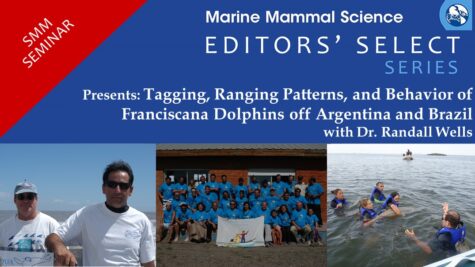
The SMM Seminar Editor’s Select Series highlights the latest and most exciting marine mammal science published in the Marine Mammal Science Journal. The SMM created this series to give scientists and citizens around the world a chance to engage with marine mammal scientists, learn and ask questions. All are welcome.
Thursday, 21 April 2022 at 3 pm EDT (12 pm PDT / 7 pm GMT)
SMM Seminar Editors’ Select Series: Tagging, Ranging Patterns, and Behavior of Franciscana Dolphins off Argentina and Brazil
This event is free to attend and presented online via Zoom, but registration is required.
Register here: https://us06web.zoom.us/webinar/register/WN_dTGrhyElS5iYsRTejxMSVQ
Space on Zoom is limited to the first 500 attendees. The talk will also be streamed live on the SMM Facebook page.
About this talk:
Franciscanas are the most endangered cetaceans in the Southwestern Atlantic, where they are exposed to human activities such as artisanal gillnet fishing and coastal development. A need for information on ranging patterns and behavior led to efforts to attach satellite-linked tags to franciscanas in three bays in Argentina and Brazil during 2005-2013. Residency, with small home ranges, occurred at each site. Movements were influenced by tides. The dolphins used the entire water column, exposing them to gillnets regardless of net depth. Definable ranges facilitate relating specific geographically based threats to appropriate population units, increasing the potential for effective conservation.
About the presenter:
Randall Wells is a co-founder and directs the Chicago Zoological Society’s Sarasota Dolphin Research Program, which conducts the world’s longest-running study of a wild dolphin population. He began studying bottlenose dolphins in Sarasota Bay, Florida, as a high school volunteer at Mote Marine Laboratory in 1970. Wells received his Bachelor’s degree in Zoology from the University of South Florida in 1975, his Masters in Zoology from the University of Florida in 1978, his PhD in Biology from the University of California, Santa Cruz in 1986, and he was awarded a post-doctoral fellowship with Woods Hole Oceanographic Institution in 1987. Wells joined the Chicago Zoological Society staff in 1989. Wells’ current research program uses a collaborative approach to examine the behavior, social structure, life history, ecology, health, and population biology of bottlenose dolphins along the central west coast of Florida, with studies focusing on up to five concurrent generations of a locally resident ~170-member dolphin community. Recent research topics include the effects of human activities on coastal dolphins, such as boat traffic, fishing activities, human feeding of wild dolphins, and environmental contaminants, and the impacts of other environmental disturbances such as red tides. He has also conducted research on a variety of marine mammals including Hawaiian spinner, Atlantic spotted, franciscana and other dolphin species, vaquita porpoises, bowhead, humpback, blue, and gray whales, and manatees. Wells is past-President of the international Society for Marine Mammalogy, and received the society’s Kenneth S. Norris Lifetime Achievement Award in 2021.
Dr. Wells will be joined by his co-authors, Drs. Marta Cremer, Leonardo Berninsone, and Krystan Wilkinson, for a Q&A session following his presentation.
Open access to all Marine Mammal Science papers is available to current SMM members. Open access to this article is made temporarily available to the public in the weeks around the presentation and can be found here.
Missed a presentation or want to share this series with a friend? All previous Editors’ Select presentations are recorded and archived on our YouTube channel here: https://www.youtube.com/playlist?list=PLUc78IynQlubS2DVS1VZoplf_t42-yZOO